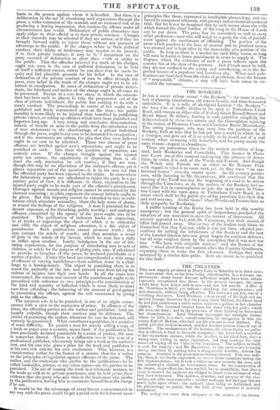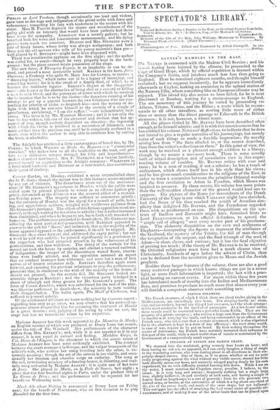THE THEATRES.
THE new tragedy produced at Drury Lane on Saturday is in three acts ; an innovation that, so far from being objectionable, is a welcome im- provement : many recent five-act inflictions might have been advan- tageously compressed into three: in the present instance, the story would have been better told in one—and best left untold. A Blot in the 'Scutcheon is brief, yet tedious : shocking, but unimpressive; and melodramatic, without being effective. The incidents are few, but of a revolting character. Lord Tresham, a man proud of his high and un- spotted lineage, discovers that his young sister Mildred, for whose hand he had just sanctioned a noble suitor, receives a gallant in her chamber nightly. The incensed brother taxes his sister with her guilt ; which she does not deny ; and in the presence of their kindred he denounces her shamelessness. Lord Tresham intercepts the midnight visiter, whom he kills in a duet; notwithstanding he recognizes in him the young Earl of Merton, who had got his consent to wed Mildred. The guilty girl dies broken-hearted, and her brother poisons himself out of remorse. Tire unchasteness of the heroine, for whose frailty no pallia- tion is offered, is fatal to dramatic sympathy : the lover falls a sacrifice to her mysterious silence; while the brother, in his blind fury, slays a wrong-doer willing to make reparation, and thus destroys the only means of wiping off the " blot in his 'scutcheon." The subject, in itself, is unfit for tragedy ; and Mr. BROWNING, in his endeavours to excite strong emotions by making what is disagreeable horrible, defeats his purpose. Aversion is the predominant feeling created. This was audi- bly, though not loudly expressed, on two or three occasions during the first representation ; but it took a ludicrous turn towards the close, and the catastrophe elicited an involuntary titter. In the construction of the drama, stage-effect has been studied, but so unskilfully, that after a scene is enacted the audience are obliged to listen to an account of what they have witnessed. The motives, situation, and purpose of the cha- racters, are alike unaccountable : neither soliloquy nor dialogue throws much light upon either ; the author's ideas being so farfetched, and his phraseology so quaint, that the drift of the speeches is scarcely understood.
The acting was more than adequate to the merits of the drama.
PHELPS as Lord Treshani, though occasionally too loud and violent, gave vent to the rage and indignation of the pioud noble with force and vehemence; tempering his fury with tenderness in the scenes with his sister. • Miss H. FAUCIT depicted the shame and wretchedness of the guilty girl with an intensity that would have been pathetic had there been room for sympathy. ANDERSON was a seemly gallant ; but he breathed both his vows and lamentations monotonously, and his dying groans were much too sonorous. Hunsox and Mrs. STERLING were a pair of lively lovers, whose levity was always malapropos; and both these and the old servant who tells of his young mistress's faux pas— well 'played by G. 13mo:cm—might have been dispensed with.
There was considerable applause on the first night ; and the author was called for, as usual—though he very properly kept in the back- ground : but the piece cannot retain possession of the stage.
The new farce, A Thumping Legacy, is as laughable as can be de- sired, and proved a most acceptable relief. KEELEY is the hero, Jerry Ominous; a Cockney who quits St. Mary Axe for Corsica, to receive a -" thumping legacy," which turns out to be a legacy of thumping, and something worse ; for it is the entail of a family-feud, of which he is -become the residuary legatee. KEELEY'S disgust at the disappoint- ment—his horror at the alternative of being shot as a coward or killing a men in cold blood, and the paroxysm of terror with which be receives the intimation that lie is to be the victim—the desperate cunning of his attempt to get up a quarrel between the two Corsicans who are con- tending for priority of claim to despatch him—and the ecstacy of de- light with which he commits himself to the custody of a couple of gensdarmes, exclaiming, " I am the ruffian !"—are indescribably ludi- crous. TI:e farce is by Mr. MADISON MORTON ; and it is not only the best he has written, but one of the cleverest and drollest that has ap- peared of late, though entirely dependent on situation : the ingenuity with which the victim is involved in a succession of dilemmas, each more critical than the previous one, until he is completely enclosed in a mesh, from which the author is only able to extricate him by cutting the knot, is admirable.



























 Previous page
Previous page